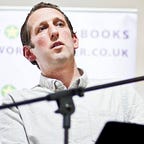Mind Your Language
Language is power, and powerlessness. The best fightback is to use it with glee, celebrate and play with it.
I am in the Anatomy Room as writers dissect their mother tongues (Welsh and Scots), sometimes in English. The current Makar, Kathleen Jamie is joined by the previous Bardd Cenedlaethol Cymru, Ifor ap Glyn. The readings are enhanced by the live signing for the deaf. In an atmosphere where minority languages are under relentless public assault, it’s sort of intoxicating to have such positivity for language in and of itself. This is not a political space; it is a space for lovers of poetry and lovers of language itself. It inspired me to think of how to respond to the low-level entrenched war on Gaelic and Scots with a leaf out of Maria Fusco’s book:
“I am for adjectives like beezer, dreich, quare, and nouns like clart, drouth, gleed, mizzle, oxters, scoot-hole, smoor, and verbs like boke, fissle, greet, hunker, swither, and adverbs like furnenst. I am for non-standard English language as a legitimate and enriching form of critical and creative writing which does not take modalities of criticality as given, rather it tends to, and experiments with non-division between practice and theory, criticism and creativity.”
Consultation to the Scottish Languages Bill is open to the Thursday 17th November 2022. It aims: ‘to establish a new strategic approach to Gaelic medium education (GME); to explore the creation of a Gàidhealtachd; to review the structure and functions of Bòrd na Gàidhlig (BnG); to take action on the Scots language’. This last point might sound like more of a threat than a promise, but here’s hoping.
So, in the next ten days between now and then we’ll be revelling in the minority, the peripheral, the transgressive, as well as dipping in and out of more serious proposals for transforming our treatment of and interaction with language in Scotland.
We live in very strange times in which Scots is both resurgent and under assault. Back in 2016 (in his essay ‘Not nationality but language’ now available in our anthology here) Scott Hames argued against language being weaponised.
He wrote:
“….it’s becoming harder to recall that it’s entirely possible to write a Unionist poem in Scots, and that English is by any sane standard a Scottish language too, not some Sassenach imposition from outside. (In case it needs saying, Polish and Urdu and Irish are also Scottish languages in this sense.) Douglas Dunn’s gently polemical verse-treatise ‘English, A Scottish Essay’ has more to say to us than ever before (‘English I’m not. As language, though, you’re mine’), but struggles to gain a hearing when Scots and English are treated as a proxies for constitutional skirmishing. This is more than a shame. There are hugely interesting and inventive things happening in contemporary Scots writing — from Bill Herbert to Jenni Fagan to Matthew Fitt to Harry Giles — but in a ‘literary’ space which feels increasingly remote, and at times out of kilter, with the waving of linguistic flags on social media and in public life. Whatever it is, Scots is more than a badge of affiliation to be kissed or spat on.”
He argued against ‘language essentialism’ and for (I think) messiness and acknowledgment of the fact that ‘language shame’ — and resistance to it — has as much to do with class than nationality. If you think of Scousers’ relationship to the idea of England, its national anthem and Wembley as its Holy Grail, you’d have to agree.
Ironically by far the most ‘language essentialism’ and weaponisation you see is from the (mostly) Unionist monoglots. Quite rightly most of the campaigners and ordinary folk revelling in using and exploring language are casting-off the typecast role as ‘victim’ and just playing. Yes, they/we are demanding rights, resources, forums and the power of restoration, but this is coming, increasingly, from a position of glee. Yes, they/we have to defend ourselves against mockery and abuse — but that is often done from a position of bewildered contempt. What is wrong with these people that feel SO threatened by other people speaking and writing? It’s a good question.
Anyway, these people are more to be pitied than scorned, and the online skirmishes should not be allowed to detract — or distract from the poetry of Victoria McNulty, or Billy Letford, or the amazing playing of Griogair Labhruidh, or the work of Karine Polwart, or Kenneth Macfarlane, or James Robertson, or Sheena Blackhall (to name a random handful) … or just from the hundreds of thousands of people enjoying language without shame.
Linguistic diversity and multilingualism are forces against the hegemony not just of a singular language but of a singular worldview. Monoculture is crushing and debilitating and contributes to memory loss and cultural abandonment as much as any species extinction. As Ifor ap Glyn reminded us, via Gwyn Alf Williams: ‘If we want Wales, we will have to make Wales’.
This is true for Scotland too, and we will make it with words and song and poetry and sound and ignore those in a bitter churn of a narrower world.
